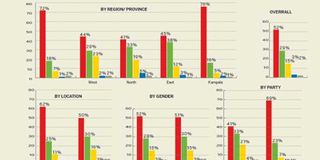80% say govt errors destroying economy

What you need to know:
New study. More than half of Ugandans think government is failing to create jobs, while 9 out of every 10 respondents say nothing is being done to bridge the gap between the rich and the poor.
A recklessly wasteful, spiralling inflation and the failure to create jobs for thousands of unemployed citizens partly explain why eight out of every 10 Ugandans have lost confidence in President Museveni’s handling of the economy, a new research reveals.
According to the latest Afrobarometer Survey conducted in partnership with Wilsken Agencies Ltd and the Centre for Democratic Governance between December 2011 and February 2012, popular ratings of the Ugandan economy have plummeted only a year after Mr Museveni’s re-election. The NRM leader’s victory is understood to have been buoyed, in part, by his perceived excellent management of the economy.
Majority of Ugandans today, however, feel the government is “doing poorly” in creating new jobs, the research shows, with 91 per cent of the 2,400 people who participated in the survey admitting that they feel government has done little to narrow the gap between the rich and the poor.
“These sharp declines over just 12 months reflect a perception of crisis in the economy for the first time in the 12-year period in which Afrobarometer surveys have been conducted in Uganda,” said a statement issued with the report’s release on Monday. “In previous rounds, the highest percentage of Ugandans indicating that the economy was doing poorly was 52 per cent, in November 2008.”
The findings show that as many as 77 per cent of Ugandans think the government is “doing badly” in improving living standards of the poor.
These results reflect a dramatic turn-around when compared to Afrobarometer’s January 2011 research, which had showed that just four out of every 10 Ugandans felt that the government was managing the economy poorly, while 57 per cent thought it was doing badly in improving living standards of the poor.
That vote of confidence has been punctured by findings in round 5 of Afrobarometer’s research in Uganda. It indicates that 75 per cent of the population now rates the economy, which is today weighed down by a 26 per cent inflation rate, as doing “fairly bad” or “very badly”, while 68 per cent feel that it is doing worse now than it was 12 months ago.
The perceived negative rankings come on the back of a decision by the International Monetary Fund to downgrade Uganda’s projected economic growth rates this year from 6 per cent to 4 per cent. In 2011, Uganda’s economic growth rate had mirrored previous good performance at a respectable 6.4 per cent.
The Monday statement said “individuals are feeling greater economic stress” today. Almost seven in 10 people described their personal living conditions as “fairly bad” or “very bad” and worse off than last year, compared to 42 per cent in December 2010.
Although a majority rate their personal living conditions as bad everywhere except Western Uganda, those living in Central Uganda appeared most dissatisfied with a paltry 18 per cent rating their living conditions as “fairly” or “very good”, compared to 38 per cent in Western Uganda.
The survey also revealed that Ugandans are “less optimistic about their personal economic future” with at least five in 10 respondents expecting their living conditions to be worse in 12 months.
“Notably, this is the first time in all the rounds of Afrobarometer in Uganda in which a majority of respondents have indicated that they expect things to be worse in the future,” Afrobarometer said.
Unemployment ranks amongst the top five problems respondents said should be addressed. Twenty-one per cent of them cited unemployment, which was more or less the average figure which accounted for opinion ranking management of the economy, poverty/destitution, poor infrastructure and health services among the top five problems facing Uganda.
The government’s handling of job creation was rated very bad by more half of the respondents. Of those, 60 per cent were from the central region, 59 per cent from the capital, while 47 per cent and 45 per cent came from the north and west, respectively.
Workers MP Dr Sam Lyomoki, who chairs Parliament’s Committee on Social Services, described the findings yesterday as “reflective of what is on the ground.”
“There isn’t a clear government strategy that can support job creation,” he said. “Of course there are a lot of ideas on paper but if you look clearly there is actually zero implementation.”
He added: “Government should also support the informal sector where many jobs can be created.”
This financial year, the government allocated Shs25 billion towards a youth scheme to aid create jobs but disagreements over who should benefit and what procedures should be followed to access the money have stalled the project.
A majority of Ugandans also admitted that in the past year there were “several times” and “many times” without cash in their pockets. Of these, the most were from central Uganda (41per cent).




